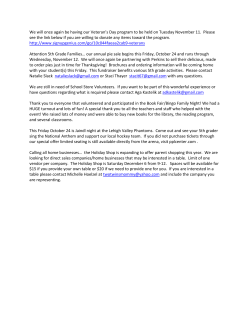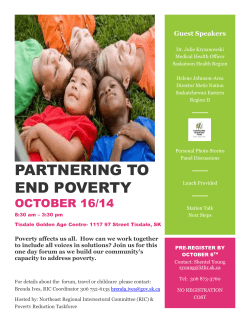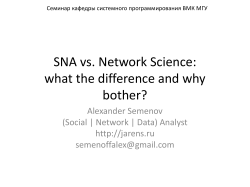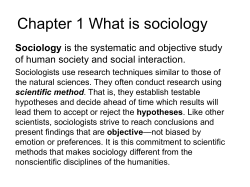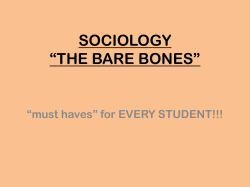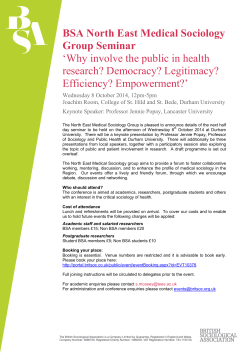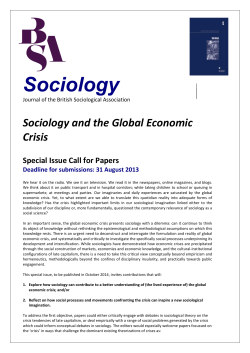
Sociology The study of people in Groups through the actions of
Sociology • The study of people in groups • Groups in the process of selfformation • through the actions of individuals • through the actions and forces of the groups themselves The Study of People in Groups • The “Scientific” study of –groups and –group formation • Groups, as collections of people in the process of self-definition Scientific Study of Groups • Involves Methods of Study • Involves Theories of Study METHODS of STUDY • • • • • • Observation (obtrusive and unobtrusive) Surveys Experiments Historical Comparison Cross-Cultural Comparison Archival Research Suspending Judgement • A key attitude in the study of society is the research approach called cultural relativism • This is in contrast to the common approach, which views other cultures and societies from the point of view of one’s own values and beliefs-- otherwise known as ethnocentrism Theories of Study • Functionalism (and variations) – structuralism • Social Conflict Theory • Symbolic Interactionism • Gender Theory (Feminist Theory) Functionalism • Social groups and society are viewed like “living organisms” • groups and group processes are studied as parts of a functioning whole • aspects and behaviors of society may have obvious (manifest) functions or “hidden” (latent) functions Functionalism: Durkheim • Emile Durkheim: French Sociologist • (1858-1917) • Considered one of the “fathers of modern sociology” Social Conflict Theory • Society is created from the ongoing conflict between key groups • According to some theorists, these groups are the main economic “classes” of society • these are made up of those who own the main wealth of society, and those who own little but their ability to labor Social Conflict Theory:Marx • The main theorist representing this approach is Karl Marx (1818-1883) • He saw society as being built out of the conflicting interests of the “owner class” and the “working class” • In his view, the ensuing struggle between classes would lead to a classless society Symbolic Interactionism • “Symbols” are the basis of social life • Individuals and societies develop through people’s interaction through symbols • Individuals develop a sense of themselves as they learn to use symbols • Individuals develop a sense of themselves as they learn to see themselves the way they believe others see them Symbolic Interactionists • Charles Horton Cooley (1864-1929) • George Herbert Mead (1863-1947) • Erving Goffman – “The Presentation of Self in Everyday Life” Culture and Society • • • • Material and Non-Material Culture Culture as “Webs of Meaning” ...As “Blueprint of/for society” Made up, as well, of norms, values, mores and folkways • The culture of a society is passed on from one generation to the next Culture and Society • The culture of any group is passed on from one generation to the next through ongoing, lifelong processes of socialization • A related concept is enculturation • Social members may even be resocialized in their lifetime if they do not “conform” to the values, mores, norms etc. of their group Socialization • Socialization (enculturation) is a life-long process, that begins at birth • We are first socialized by those who are closest to us in our early months and years • This first development is called primary socialization • Later we are socialized through our wider society, and this is called secondary socialization Groups • Sociology is the study of groups of people in process of self-definition as groups • A group is a collection of people (but not all collections of people are groups!) • Sociology studies, among other things, how individuals impact and shape groups • Sociology studies, as well, how groups impact and shape individuals Groups: Common Terms • aggregate • category • voluntary and involuntary groups • reference groups • peer groups • primary and secondary groups Groups: More Terms • status – achieved – ascribed • roles • in-group • out-group Formal Organizations • Formal organizations are usually largescale groups that have a planned focus and a clearly defined structure • Such organizations are often referred to as bureaucracies • Max Weber studied bureaucracies as ideal organizations of complex, modern society Bureaucracies • According to Weber, bureaucracies represented the ideal organization of large-scale, modern society • ....with such characteristics as the complex division of labor • ...with a hierarchical structure of authority • ...and a complex system of clear and predictable rules Social Inequality • A persistent character of groups throughout the world is that of stratification • Stratification is the unequal division of societies • This division can be based on a variety of factors including: Stratification: • Class... • Race... • Gender... • Power... • Prestige... Class: Marx • According to Marx (and other social conflict theorists) class is the division of societies into several main groups, including: • ...those who own the productive wealth of society • ...those who own only their labor (the workers) Class: Marx • In this theory, this was the fundamental difference between the classes of industrial society • ...and this division would eventually disappear as workers struggled for the power of the owner class Class: Weber • According to Weber, the stratification of society was based on a broader range of factors, including • ....wealth • ....power • ....prestige • And one could have any one of these to be in a “higher” class..... (examples?) Poverty Among the Stratified • Poverty is a persistent feature of stratification throughout the world • While many would argue about its very definition • And many would argue about its real cause(s) Relative and Absolute Poverty • Much of poverty in the world is what could be termed “relative poverty”.... • While much of the world lives in “absolute poverty... • ...the latter being a state in which one’s very survival is threatened by the lack of resources (eg. food, clothing, medical care etc.) Causes of Poverty • Why does poverty persist in the world? • Functionalist view.... • Social-conflict theory... • Social-interactionist theory... • Gender/Feminist theory... Other Divisions: Race and Ethnicity • Race and ethnicity are also dividing factors in our society (and our wider world) • Race is the social definition of people based one biological characteristics • Ethnicity is the social definition of people based on cultural ties (like language, dress, customs, beliefs, etc.) Race: Key Terms • • • • • • Prejudice Discrimination Racism Social definition of Race Institutional Racism Minority Status Race: More Key Terms • • • • • • Genocide (“ethnic cleansing”) Expulsion Segregation (apartheid) Assimilation Amalgamation Cultural pluralism Other Divisions: Gender • Sex: biological characteristics – xy/xx, hormones, primary and secondary sex characteristics • Gender: the social definition of groups based on biological characteristics.... • (sound familiar? see the variation of this theme under “race”) Gender: Nature vs. Nurture • How much of what we are as “masculine” and “feminine” is • .....learned through socialization... • .....or “built-in” to us through our genes, hormones and brain-structure? Gender: biological destiny? • How much of the stratification of our society along gendered lines is “natural”-based on our biological make-up.... • ....and how much is the result of social definition of opportunities etc. based on biological makeup....? Gender: biological destiny? • • • • the “glass ceiling”... female job-ghettos the “feminization of poverty” Are these “natural divisions” of the world? Social Institutions • Society is in process of self-definition... • As social practices of groups become familiar, accepted and expected they become what sociology calls institutions • This refers to organized practices and relationships of society, rather than to physical places... Social Institutions Include... • • • • ...family ...religion ...economics and politics ...education Family: The way we never were... • The sociological study of family: • historical comparison... – Kodachrome...”the good-old days”... • cross-cultural comparison... – “family values” around the world... • family today: the “ideal” vs. “the real” Religion= Primitive Science? • The “enlightened view” of “religion”... – “science” replacing “religion” – the emergence of “rational” explanation of the world • Classifying the world’s cultures : from “savagery” to “civilization”? • Sociologists get involved..... – Durkheim et. al Religion vs. Science? • Is there necessarily any conflict between religion and science? • examples of conflict in history.... – the earth is the center of the universe – there is no such thing as a vacuum – “God” created “man” on the 7th day... not through “evolution”.... Religion vs. Science? • Why did such scientific assertions challenge religion? • Do they necessarily undermine, or contradict religious beliefs and tradtitions? • Today, does the sociological study of religion necessarily mean the rejection of religion? Sociology and Religion: Which theory would say... • “Religion dulls people to the reality of class conflict...” • “Religion should be studied for the things it does for the cohesion of society...” • “Religion should also be studied for its gendered character in history and contemporary society...” Deviance and Social Control • Remember... “Sociology is the study of.....” • Groups in “self-definition” set boundaries... – who belongs – who does not • This is done by the way people talk, dress, behave etc. Deviance and Social Control • “Deviance” is relative to values of the wider society.... How is this so? – or.... if a “deviant” fell in the woods, and nobody was around to hear this.... • “Deviant” behavior and beliefs often find their way, eventually, into “mainstream” society: – or... underwear as outerwear.... Deviance and Social Control • “Deviant behavior” today may also have been accepted social practice in the past... • spare the rod and avoid the DCYF • no smoking! you @#@!@!##@ • opium under the Pastor’s porch... Which theory would.... • ...See “deviance” as the definition of the powerful in a society? • ...See “deviance” as learned through processes of seeing oneself in relation to others and their expectations? • ...See “deviance” as having some “positive” functions in society, as well as being a sign of the malfunction or dysfunction of society? A Rap on Deviance • The “latent” and “manifest” functions of “parental advisory”stickers • But isn’t Rap just “missing a C”? • Rap... In context of history.... • A conflict of power in history and contemporary society? U.S. Income Distribution 43 42 41 40 Top 5th 39 38 37 1945 1955 1965 1975 1985 1995 U.S. Income Distribution 45 40 35 30 25 Top 5th Fourth 5th 20 15 10 5 0 1945 1955 1965 1975 1985 1995 U.S. Income Distribution 45 40 35 30 Top 5th Fourth 5th Third 5th 25 20 15 10 5 0 1945 1955 1965 1975 1985 1995 U.S. Income Distribution 45 40 35 30 Top 5th Fourth 5th Third 5th Second 5th 25 20 15 10 5 0 1945 1955 1965 1975 1985 1995 U.S. Income Distribution 45 40 35 Top 5th Fourth 5th Third 5th Second 5th Bottom 5th 30 25 20 15 10 5 0 1945 1955 1965 1975 1985 1995
© Copyright 2025
